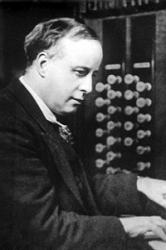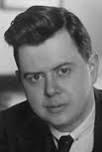Planning worship?
Check out our sister site, ZeteoSearch.org,
for 20+ additional resources related to your search.
- |
User Links
Person Results
Henry G. Ley

1887 - 1962 Person Name: Henry Ley, 1887-1962 Harmonizer of "VULPIUS (GELOBT SEI GOTT)" in The New English Hymnal Born: December 30, 1887, Chagford, Devonshire, England.
Died: August 24, 1962, near Ottery, Devonshire, England.
Ley trained as a chorister at St. George’s Chapel, Windsor, as a music scholar at Uppingham, the Royal College of Music, and as an organ scholar at Keble College, Oxford. He was Precentor of Radley College; organist at Christ Church Cathedral, Oxford (1909-26); Choragus of the University, Oxford; professor of the organ at the Royal College of Music (1919); and organist at Eton College.
Sources:
Frost, p. 680
West, p. 87
http://www.hymntime.com/tch/bio/l/e/y/ley_hg.htm
Henry G. Ley
G. K. A. Bell
1883 - 1958 Author of "Christ Is the King! O Friends, Rejoice" in Rejoice in the Lord George Kennedy Allen Bell was born in 1883. He was educated at Westminster School and Christ Church, Oxford. He was chaplain to the archbishop of Canterbury in 1914, was appointed as Dean of Canterbury in 1924 and became the Anglican bishop at Chichester in 1929. He was interested in ecumenism and friendship between the Anglican Church and churches in other countries and was instrumental in starting the World Council of Churches. He was also interested in religious drama and the integration of arts in the church.
Dianne Shapiro, from Lambeth Palace Library archives
G. K. A. Bell
Erik Routley
1917 - 1982 Person Name: Erik Routley, b.1917 Harmonizer of "VULPIUS" in The Book of Praise
Erik Routley
Melchior Vulpius
1570 - 1615 Person Name: M. Vulpius Composer (melody) of "GELOBT SEI GOTT" in Rejoice in the Lord Born into a poor family named Fuchs, Melchior Vulpius (b. Wasungen, Henneberg, Germany, c. 1570; d. Weimar, Germany, 1615) had only limited educational opportunities and did not attend the university. He taught Latin in the school in Schleusingen, where he Latinized his surname, and from 1596 until his death served as a Lutheran cantor and teacher in Weimar. A distinguished composer, Vulpius wrote a St. Matthew Passion (1613), nearly two hundred motets in German and Latin, and over four hundred hymn tunes, many of which became popular in Lutheran churches, and some of which introduced the lively Italian balletto rhythms into the German hymn tunes. His music was published in Cantiones Sacrae (1602, 1604), Kirchengesangund Geistliche Lieder (1604, enlarged as Ein schon geistlich Gesanglmch, 1609), and posthumously in Cantionale Sacrum (1646).
Bert Polman
Melchior Vulpius
George Lockwood
b. 1946 Person Name: George Lockwood, b. 1946 Translator of "Christ Is the King (¡Cristo Es el Rey!)" in Oramos Cantando = We Pray In Song Rev. George Lockwood was born in 1946 and has been a missionary to Costa Rica. He has pastored Spanish-speaking congregations in both Arizona and California and served on the editorial committee for the Methodist hymnal supplement Celebremos II. In addition, Lockwood has traveled throughout Central and South America interviewing church musicians and gathering new hymns from both Spanish and Portuguese cultures which he then presents at conferences and workshops.
The Presbyterian Hymnal Companion, 1993
George Lockwood
David McK. Williams
1887 - 1978 Person Name: David McKinley Williams, 1887-1978 Composer of "CHRISTUS REX" in The Hymnal 1982 David McKinley Williams (Conductor)
Born: February 20, 1887 - Carnarvonshire, Wales, UK
Died: March 13, 1978 - Oakland, California, USA
The Welsh-born American church musician, composer, and teacher, David McKinley Williams, began his career in church music as a chorister in the choir of the Cathedral of St. John, Denver. At the age of 13 he became the organist of St. Peter's Church, Denver.
In 1908 David McKinley Williams went to New York to serve as the organist of Grace Church Chapel. He moved to Paris in 1911 for study with some of the best known French organists of the time. Upon his return, he served as organist of the Church of the Holy Communion in New York. He served in the Royal Canadian Artillery in World War I and returned to his New York position in 1920. After only six months, he was appointed organist and choirmaster of St. Bartholomew's Church, New York. He held this position until his retirement in 1947.
David McKinley Williams developed one of the most outstanding music programs in the USA at St. Bartholomew's. He was head of the organ department of the Juilliard School of Music and a member of the faculty of the School of Sacred Music, Union Theological Seminary. He also served as a member of the Joint Commission on Church Music and the Joint Commission on the Revision of the Hymnal that produced The Hymnal (1940). The Hymnal 1982 uses five of his tunes, including MALABAR used with "Strengthen for Service" (Hymn 312), CANTICUM REFECTIONIS, used with "This is the hour of banquet and of song" (Hymn 316), and GEORGETOWN, used with "They cast their nets in Galilee" (Hymn 661).
Source: The Episcopal Church - Liturgy Music Website
David McK. Williams
Friedrich Layritz
1808 - 1859 Person Name: Friedrich Layriz, 1808-1859 Harmonizer of "GELOBT SEI GOTT" in Common Praise Friedrich (also: Fridrich) Christoph Ludwig Eduard Layriz (also: Layritz, Lairitz, * January 30 1808 in Nemmersdorf, today part of Goldkronach, † March 18 1859 in Unterschwaningen ) was a German Lutheran pastor and Hymnologist.
Friedrich Layriz came from a Franconian family, went to school in Bayreuth and studied Protestant theology at the universities of Leipzig and Erlangen. In Erlangen, he was influenced by the Erlanger theology to Christian Krafft and Georg Karl von Raumer. He was pastor from 1837 to 1842 he provided the second Parochial ministry in the St. St. John's Church in Hirschlach, then from 1842 as pin preacher in St. Georgen (Bayreuth). In 1846 he was named after a literary quarrel with the priest Elias Sittig to the future Bavarian Hymns transferred to Unterschwaningen.
Layriz' importance lies in the collection and rediscovery of Lutheran chorales from the time before the Enlightenment theology, which were widely heavily revised or completely forgotten, and their original polyrhythmic melodies. In 1844 he published the programmatic core of the German hymn of Luther to Gellert with 450 hymns, the major influence on the song book design in Bavaria (1854), Germany and should have in the German-speaking Lutherans in North America. The collection and subsequently by Layriz published chorale books were certainly not historical-critical editions, but for practical use. Therefore, there are also additions and alterations by Layriz therein, such as the until now sung in Protestant churches verses 3 and 4 of "Es ist ein Ros sprung" (EC 30).
In the area of liturgy Layriz worked. He conducted research on the service in the Age of Reformation and was responsible for the musical aspect of the liturgy of Wilhelm Lohe.
http://de.wikipedia.org/wiki/Friedrich_Layriz
See also in:
Wikipedia
Friedrich Layritz
Sir Ernest MacMillan

1893 - 1973 Person Name: Ernest Campbell MacMillan, 1893-1973 Harmonizer of "VULPIUS" in The Book of Praise Ernest MacMillan (Conductor)
Born: August 18, 1893 - Mimico, Canada
Died: May 6, 1973 - Toronto, Canada
The eminent Canadian conductor and composer, Sir Ernest (Alexander Campbell) MacMillan, began his organ studies with Arthur Blakeley in Toronto at age 8, making his public debut at 10. He continued his organ studies with A. Hollins in Edinburgh from 1905 to 1908, where he was also admitted to the classes of F. Niecks and W.B. Ross at the University.
Ernest MacMillan was made an associate (1907) and a fellow (1911) of London’s Royal College of Organists, and in 1911 received the extramural Bachelor of Music degree from the University of Oxford. He studied modern history at the University of Toronto from 1911 to 1914, before receiving piano instruction from Therese Chaigneau in Paris in 1914. In 1914 he attended the Bayreuth Festival, only to be interned as an enemy alien at the outbreak of World War I. While being held at the Ruhleben camp near Berlin, he gained experience as a conductor. He was awarded the B.A. degree in absentia by the University of Toronto in 1915. His ode, England, submitted through the Prisoners of War Education Committee to the University of Oxford, won him his Doctor of Music degree in 1918.
After his release, Ernest MacMillan returned to Toronto as organist and choirmaster of Timothy Eaton Memorial Church from 1919 to 1925. In 1920 he joined the staff of the Canadian Academy of Music, and remained with it when it became the Toronto Conservatory of Music, serving from 1926 to 1942 as its principal. He was also dean of music faculty at the University of Toronto from 1927 to 1952.
Ernest MacMillan was conductor of the Toronto Symphony Orchestra from 1931 to 1956, and of the Mendelssohn Choir there from 1942 to 1957. He also appeared as guest conductor in North and South America, Europe, and Australia. He served as president of the Canadian Music Council from 1947 to 1966, and of the Canadian Music Centre from 1959 to 1970. In 1935 he was the first Canadian musician to be knighted, an honour conferred upon him by King George V. He also received honorary doctorates from Canadian and USA institutions. He conducted many works new to his homeland, both traditional and contemporary.
--www.bach-cantatas.com/
Sir Ernest MacMillan
Charles R. Anders
b. 1929 Person Name: Charles R. Anders, b. 1929 Composer of "BEVERLY" in Evangelical Lutheran Worship
Charles R. Anders
Ronald Arnatt
1930 - 2018 Person Name: Ronald Arnatt, 1930- Composer of "SOUTH GORE" in Hymnbook for Christian Worship
Ronald Arnatt


 My Starred Hymns
My Starred Hymns


